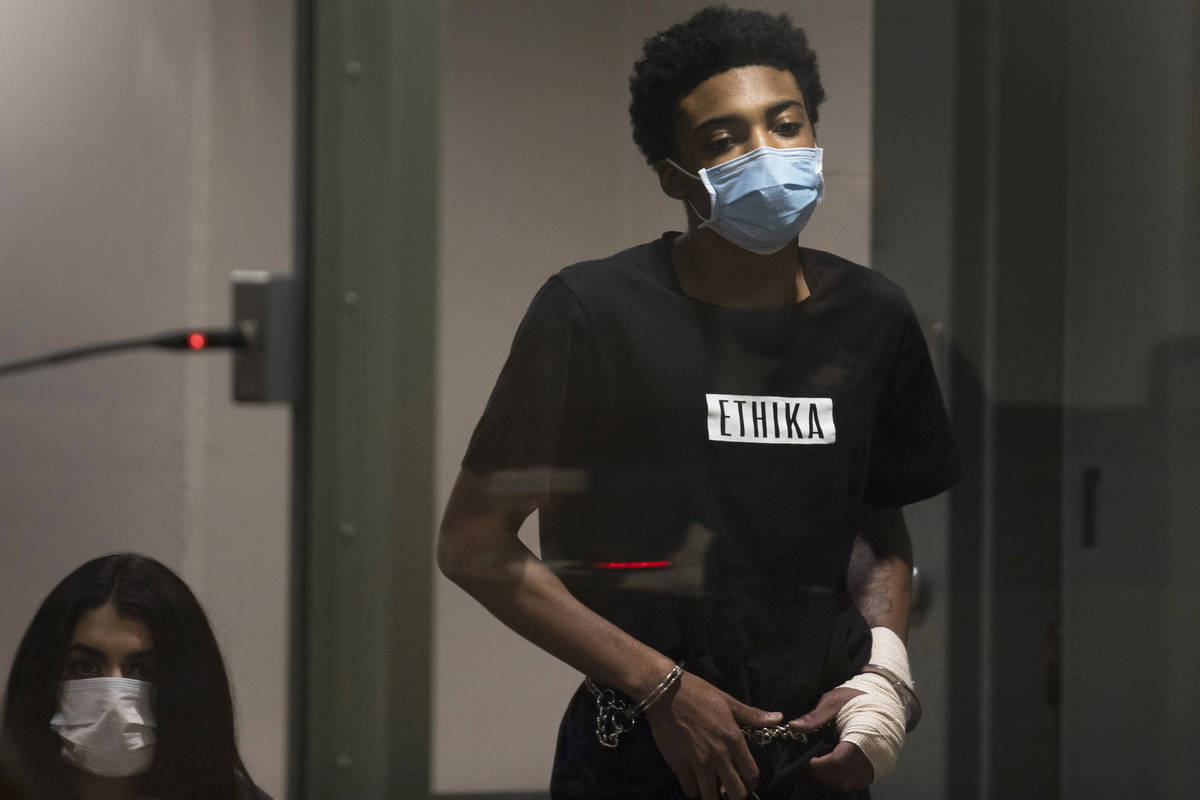Zaon Collins indictment dismissed over absence of DUI charge

Bishop Gorman High School basketball standout Zaon Collins was indicted on a reckless driving charge Thursday in connection with a crash that left another man dead, but a grand jury declined to indict the 19-year-old on a DUI charge.
A prosecutor then dismissed the reckless driving indictment during a brief video conference court hearing.
But that does not mean Collins, who is free on electronic monitoring, was cleared of either charge.
Prosecutor Thomas Moskal told a judge that he planned to continue with a preliminary hearing on the charges scheduled for next week.
Collins still faces one count of reckless driving and one count of driving under the influence causing death in connection with the Dec. 30 crash that killed 52-year-old Eric Echevarria, an Army and National Guard veteran who worked as a custodian at a local elementary school. The charges carry a maximum penalty of 20 years in prison.
Prosecutors have said that a blood test showed Collins had an amount of THC in his system at the time of the crash that was above the legal limit for drivers in Nevada. THC, or tetrahydrocannabinol, is the active ingredient found in marijuana.
The decision to proceed with the DUI charge through a preliminary hearing, despite a grand jury rejecting the count, is “extremely unusual,” said defense attorney Chris Rasmussen, who regularly handles DUI cases but is not involved in the Collins case.
“If the grand jury doesn’t indict a case, the facts are a farce, there’s no case,” he said. “The standard is so low to get an indictment. If a prosecutor is unable to return an indictment or a true bill against a defendant in front of a grand jury, it signals that the case is extremely weak and shouldn’t proceed.”
Sister ‘hoping and praying’
Authorities have said Collins was driving upward of 88 mph in a 35 mph zone before his 2016 Dodge Challenger slammed into Echevarria’s 2016 Hyundai Accent near Fort Apache and Blue Diamond roads.
Echevarria’s sister, Marie, said Thursday that she learned of the latest development in Collins’ case through a news report.
“I’m not understanding why, because he was driving under the influence,” she said. “It was on the police report. They even took his blood. They found it in his car. He was high. I don’t understand why the grand jury would not indict on that if they had evidence.”
She said she and her family were still processing their loss.
“It’s a lot for me right now,” Marie Echevarria said. “I’m hoping and praying that my brother gets justice, because at the end of the day (Collins) was driving under the influence. He was speeding … If it wasn’t my brother, it could have been somebody else. It could have been a child.”
Preliminary hearing set
Attorneys for Collins, David Chesnoff and Richard Schonfeld, were present at Thursday’s hearing.
“The district attorney chose to present its case to a duly convened grand jury,” Chesnoff and Schonfeld told the Review-Journal shortly after the hearing. “And they (grand jurors) decided to charge Mr. Collins with only one count of reckless driving. The district attorney then chose to dismiss it.”
District Attorney Steve Wolfson’s office issued an emailed statement to reporters after the hearing.
“Prosecutors can take a case to trial by either conducting a Preliminary Hearing or proceeding to the Grand Jury,” he said. “A Criminal Complaint in this case was filed on January 7, 2021 and a Preliminary Hearing is scheduled to occur next week on March 18, 2021. We intend to proceed to the Preliminary Hearing as scheduled. By law, we are not permitted to comment publicly on any proceedings that may have occurred at the Grand Jury.”
Under Nevada law, if a grand jury indicts a defendant, transcripts of the testimony presented to the grand jury would eventually be made public. But if the grand jury returns what is known as a “no bill,” or declines to indict the defendant, as in Collins’ case, those transcripts are not considered public record. Neither defense attorneys nor a judge are present during grand jury proceedings.
Testimony during a preliminary hearing, however, would be open to the public, defense attorneys would be allowed to cross-examine witnesses, and a judge would decide whether prosecutors had enough evidence to take the case to trial.
Police said they found a green leafy substance in Collins’ Challenger and that he showed signs “which were consistent with being under the influence of marijuana.”
Collins, who played point guard at Bishop Gorman, had signed a letter of intent to play basketball at UNLV, but that agreement was rescinded after he was charged in the crash.
Prosecutors have said that Collins had 3.0 nanograms per milliliter of THC in his system, while the legal limit for drivers in Nevada is 2.0 nanograms per milliliter.
Another prominent DUI defense attorney, Chip Siegel, said the grand jury’s refusal to indict Collins on a DUI charge could amount to jury nullification, or essentially sidestepping the law with the belief that Collins may not have been impaired at the time of the wreck.
“Our levels in the state of Nevada are artificially low compared to other states that have per se levels and probably are out of step with the scientific community,” Siegel said.
A high-profile marijuana DUI case such as the charges against Collins could prove groundbreaking for Nevada law, Siegel added.
“The real question is whether the legislature finds out about a case like this,” he said, pointing out that recreational marijuana is legal in the state. “That would be my hope — that someone up in the Legislature looks at this. We’re making criminals of people who shouldn’t be.”
Contact David Ferrara at dferrara@reviewjournal.com or 702-380-1039. Follow @randompoker on Twitter.